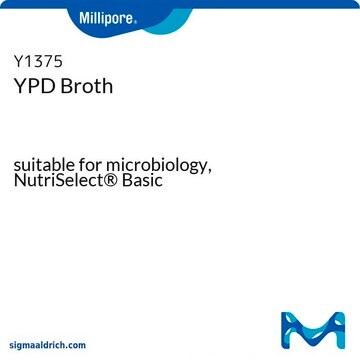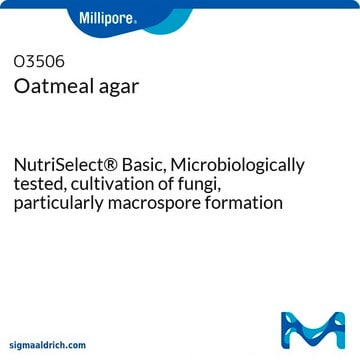P6685
Kartoffel-Dextrose-Bouillon
suitable for microbiology, NutriSelect® Basic
About This Item
Empfohlene Produkte
Sterilität
non-sterile
Qualitätsniveau
Form
powder
Zusammensetzung
Dextrose, 20 g/L
Potatoes, Infusion from, 4 g/L
Hersteller/Markenname
NutriSelect® Basic
Methode(n)
microbiological culture: suitable
pH-Endwert
4.8±0.5 (25 °C)
Anwendung(en)
food and beverages
microbiology
Eignung
bacteria
molds
yeasts
Allgemeine Beschreibung
Anwendung
Komponenten
Angaben zur Herstellung
Hinweis zur Analyse
Fußnote
Die Bezeichnung Basic, Plus oder Prime wird angehängt als Hinweis auf die Qualitätskontrollstufe — von einer grundlegenden Qualitätskontrolle über die gängige QC-Plus bis hin zu Prime für eine vollständige Einhaltung behördlicher Auflagen.
Rechtliche Hinweise
Lagerklassenschlüssel
11 - Combustible Solids
WGK
WGK 1
Flammpunkt (°F)
Not applicable
Flammpunkt (°C)
Not applicable
Hier finden Sie alle aktuellen Versionen:
Analysenzertifikate (COA)
Die passende Version wird nicht angezeigt?
Wenn Sie eine bestimmte Version benötigen, können Sie anhand der Lot- oder Chargennummer nach einem spezifischen Zertifikat suchen.
Besitzen Sie dieses Produkt bereits?
In der Dokumentenbibliothek finden Sie die Dokumentation zu den Produkten, die Sie kürzlich erworben haben.
Kunden haben sich ebenfalls angesehen
Unser Team von Wissenschaftlern verfügt über Erfahrung in allen Forschungsbereichen einschließlich Life Science, Materialwissenschaften, chemischer Synthese, Chromatographie, Analytik und vielen mehr..
Setzen Sie sich mit dem technischen Dienst in Verbindung.










